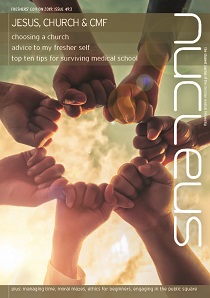EMILY
CULLIS
WROTE...
plan carefully
I would like to make the analogy of a tightrope across a crevasse to describe medical school. If you start off holding a well-balanced pole, and the wind is light and you stop along the way, chances are you'll make it to the end. If however, you begin with a pole that is far heavier on one side, and the weather gets stormy, with no rest stops, your chances of making it to the end are much slimmer.
My first year at medical school started with my pole heavily weighed down on one side by medical and social problems, which only got bigger as the year went on. I didn't do enough to balance the other side with church, exercise and friends, which only made matters worse. I missed all my rest stops by frantically revising through the holidays. When exams came, I couldn't maintain that precarious balance anymore: I fell off that tightrope.
So here are a few tips on surviving first year:
1. find your balance
Some people can find a way to sleep enough, party four nights a week and maintain reasonable grades. Chances are you are not one of these mythical beings! I try to aim for a nine/eight/seven pattern - nine hours sleep, eight hours work and seven hours 'me time'. Those seven hours include basic things like eating, washing and exercise, but also time with God. That's not to say you should do as I do, but try to maintain a routine and make partying a special occasion thing. (No, 'that Friday feeling' is not a special occasion!)
2. keep on top of your lectures and other work
Everything you are taught is important and nothing is quite 'common sense'. If you're coming from A-levels, prepare yourself for a much higher workload. Nothing will stress you out more than trying to learn a huge amount of information over that one weekend you left free for revision!
3. plan your days… and your weeks and months
We all know how time can go when a new Netflix series comes out, but sometimes it can feel like weeks and months have gone by. I find it helps to have a rough outline of my day (prioritising sleep and exercise), with an idea of how many hours of lectures and studying I'm going to do. This should increase as you move towards exams, but never at the expense of your health. It is also handy to look at what topics you've covered a lot over the year, so you can target your revision.
4. find your social group
In your first few days at university, you'll probably spend a lot of time with your housemates. This is important as no one wants awkward shared kitchens, but remember to make time in Freshers' Week to get yourself plugged into a local church, CMF group and CU. If you've got a society or sports team in mind, it's better to wait a couple of weeks until the hype dies down.
5. remember why you're here
It's easy to slip into the mindset of 'I'm not good enough to be here'; 'I've got to get the top grade or I'm letting God and my family down'. Remember you have made it to this point because your medical school thinks you are good enough, and because this is part of God's plan for your life. For some people, getting top grades might be their way of honouring God, but for others, a pass is what they need to progress in their journey to becoming Christian doctors.
Finally, if things are going badly, whether that be academically, socially, medically or spiritually - SEEK HELP. Often catching problems early can prevent them blooming into disasters, but if it becomes obvious medicine isn't your way to honour God, pray about it and remember you are precious to God and your life, not just your medical career is in his hands.
JAMES
HOWITT
WROTE...
try churches earnestly and quickly
When you go to university, you will create barriers to joining a church. The laziness of wanting a Sunday morning lie-in after a late Saturday night; the Sunday football practice session which you so deeply want to succeed at; feeling that attending Christian Union on a Friday is enough engagement with Christians — and that you'd hate to get stuck in a 'Christian bubble'.
Resist all these mental narratives. There is such a thing as the bubble, but church and Christian Union in the same week definitely doesn't mean you're in it! That's just an excuse you've created. Sporting achievements can honour God, but not if you don't conduct the rest of life in a way pleasing to him. And true rest is found in Christ, not on your pillow!
So try lots of churches, a different one each week. Don't be afraid to try churches that seem 'stuffy' in their conservatism, or that seem 'weird' in their charismata. The entirety of Christian corporate engagement is larger than the single, middle-of-the-road Anglican church you've attended until now, and there is so much that you can learn from those at both ends of the spectrum. Without a regular church, at best you'll spend the next few years stagnating in your faith, and at worst find that it slips away.
Once you've tried a few, don't put off prayerfully choosing one. When deciding, remember that church is only of benefit if you actually — go. Yes, the church an hour away might be amazing, but if you never go it's pointless. You can't find true Christian fellowship and discipleship any other way, so try churches earnestly and then choose one early.
REBECCA
HORTON
WROTE...
dear first year me,
Our heavenly Father cares much more about who you are than what you achieve. I was really excited to start medical school, and there are so many good things to look forward to. There is also a lot of pressure. It is very easy to feel like you must excel at everything: exams, sport, church — even friendships — to be of any value. This is not true. If this is you, Iet me encourage you. Though many of us battle with high expectations throughout medical school (and I still do), happily, God can make our work a joy.
The whole biblical narrative adorns human beings with great honour, dignity and respect and can be considered the foundation of holistic medicine. Be very encouraged that your faith gives you this basis for good practice and remind yourself of it when you are up late memorising. People in hospital are often lonely and afraid and you have the privilege of coming alongside them. Spend time listening properly to patients; guard against reducing them to their illness. They will appreciate your care, and your understanding of sickness will be made so much richer.
Be encouraged by what God says about you too. You're no less of a human being when you're a first year mistaking an X-ray of a knee for an elbow (thankfully, my radiology skills have improved since then!) than you are as a hot shot medical director who also runs a research group. Knowing this is great ammunition for those days where you feel useless and brings freedom to work hard without being burdened.
Most importantly, be encouraged by the knowledge of who your heavenly Father is. You are human, and you will mess up. Maybe you'll fail to love a patient. Perhaps you'll snap at your housemate over the dishes. You might find yourself studying for your own exam glory. Still be encouraged, because ultimately it is all about him. He died for us whilst we were still sinners (Romans 5:8), loves us with an everlasting love (Jeremiah 31:3), and promises to one day restore all things (Acts 3:21).
Emily Cullis is a former CMF Deep:ER volunteer and is a medical student in York
James Howitt is a doctor who performs Work Capability Assessments and a CMF Associate Staff Worker in Essex
Rebecca Horton is an FY1 in Oxfordshire
































